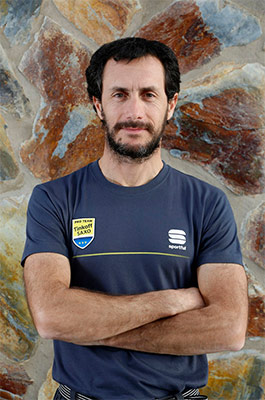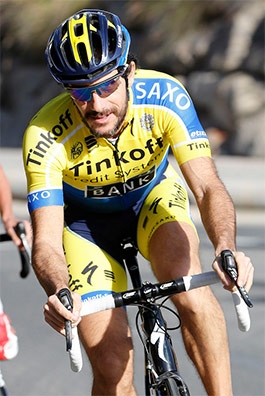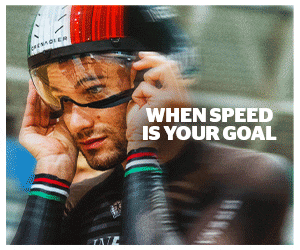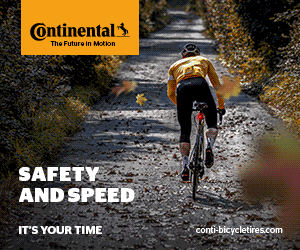Tinkoff-Saxo CEO Stefano Feltrin talks about the direction and aims of the team after Oleg Tinkov’s recent acquisition of the team
 |
TEAM PRESS RELEASE
Oleg Tinkov’s recent acquisition of Tinkoff-Saxo has not only seen a change of name but a new direction on which to become the strongest, most successful cycling team in the world.
Continuing to build on the historic investment chiefly from sponsors Tinkoff Credit Systems and Saxo Bank and the technical direction of Bjarne Riis, with the new ownership, Tinkoff-Saxo now has what all teams crave – stability. And with that in place they can further develop the success of riders including Alberto Contador and Nicolas Roche.
New CEO Stefano Feltrin talks about the impact of the takeover:
Q: It’s well known that the success of Tinkoff Credit Systems has made Oleg Tinkov a very wealthy man. Does that translate into greater funds for the team?
Stefano: Oleg is very focused and will do whatever it takes to achieve the team’s goals. But that doesn’t mean we’re going to pay inflated prices for anything.
I always say, ‘To reach the desired results, you need funds. But if you have only money and don’t use it properly, you’re not going to reach that goal.’ It’s my role as CEO to invest the resources in the best possible way and it doesn’t just become an expense.
Q: In the past, a great emphasis lay on Bjarne Riis’ shoulders to seek sponsors as well as coaching the team. Has that changed?
Stefano: Yes. Bjarne can now concentrate 100 per cent on the sporting side, while everything to do with running a professional structure – a business, if you will – is my responsibility. That makes it much easier for Bjarne to focus on improving the team and our results.
It’s a big turning point. Now we don’t need the owner of the team to keep looking out for sponsors. And it’s not just us. Trek has a similar set-up, as does Cannondale.
We’re seeing this development where the owner pays the expenses of the team and the team knows that there’s a financial stability in place. Of course, we’re going to look for sponsors who’ll contribute to the team but, if we don’t get them, we’re not going to be disbanded.
Q: Will the takeover stimulate changes in how the team approaches training and racing?
Stefano: We’re looking to work with partners who’ll provide us with significantly more factual, scientific data of what works and what doesn’t. That’ll apply to bicycles, clothing, training, nutrition, recuperation, stretching and fitness.
We have a very solid base but, in this competitive environment, things change rapidly so you need to be fast in improving yourself.
Look at the clothing, for instance. We have a great sponsor in Sportful and there’s a lot of exciting work being done on the aerodynamic side; and on aspects such as the weight of the clothing; and the quality of fabric in terms of comfort for the riders in the heat and the cold. They are working hard to improve all these elements and more, and that is the level we demand from suppliers, partners and sponsors.
We believe this hasn’t been researched to the extent of other sports. For instance, my previous experiences were in America’s Cup sailing and Formula 1. The amount of data analysis and R&D was huge. And it’s not quite there in cycling yet. That’s where we have to go.
Q: Practically, how will you research and apply the latest sports science discoveries?
Stefano: There are several ways. We’re looking for Tinkoff-Saxo to work closer with the current sponsors – Tinkoff Credit Systems and Saxo Bank – and to forge further partnerships with the right new sponsors; to work far more with universities; spend greater time meeting the most respected sports scientists; and to connect with elite teams in other sports such as sailing, Formula 1 and MotoGP.
That last one is very interesting. There are many sports where you have the human being and equipment working together. What we’ve got to understand is that not necessarily the perfect set-up for one rider will apply to all. Everybody is different, and we must think of every individual and their bike as a whole, not just wheels, frame, bars and human.
Ultimately, whether it’s nutrition, recuperation, training or racing, we want to bring in more science, so when you make a decision of what wheel you’ll use during, for example, a time trial, it’s based on data rather than a gut feeling. It’s more pragmatic and more about following protocols from scientific studies to make decisions. And each rider can then apply that information to their individual performance.
Q: Finally, how can the UCI ensure teams don’t continue to disappear like the recently disbanded Vacansoleil and Euskaltel?
Stefano: It’s very exciting because there’s a new UCI process that started with the election in October. We have one person from Tinkoff-Saxo in the UCI working group who’ll help from the inside, and we’re very open to helping out in the process of change to create sustainable teams.
It’s no secret: running a team is very expensive and there are very limited sources of income for the team. Unlike some other sports there are no ticket sales, no trading in riders… We know it’s going to take time but Tinkoff-Saxo is committed to helping the UCI wherever possible.
It’s the same with becoming the most consistent, fastest team in the world. It’ll take time. If it takes one year, that’s great. But if it takes longer, so be it. We’re going to take each step as rapidly as possible but are determined not to rush and get it wrong. And that means continuing to work hard as a team, working closely with our current sponsors, and forging new relationships with carefully selected partners.
Other Results on VeloUK (including reports containing results)
- Features, Reports, Results
- Result: Beverley Town Centre Races
- Hill Climb Championships: Change of Course
- Crit Result: Portsmouth Evening Circuits 11
- Crit Result: RCR FatCreations Goodwood Summer Special
- UK Armed Forces Inter-services Road Race
- Report: TLI Cycling ‘Belgium Training Series
- BMCR RESULT: The Ron Day MK Bowl Circuit races (July 23rd)
- RR Result: Bath RC Junior National Series Road Race
- Crit Result: West Thames League 15
- Crit Result: SACA Salt Ayre Tuesday Series 15
- Crit Result: Bath CC Mid Summer Series 2
- Crit Result: Full Gas Summer Circuit Series #17
- TT Result: Ross-On-Wye & Dist CC 25m TT
- TT Result: Ross-On-Wye & Dist CC 10m TT
- TT Result: Kernow Racing Team 10m TT
- News: Men’s Tour of Britain Route (Stage 1 & 2)
- Youth Result: RL360 Isle of Man Youth League 14
- TT Result: Verulam Cycling Club 25m TT
- TT Result: Manchester & District Ladies CA 25m TT
- TT Result: Ferryhill Wheelers CC 25m TT
- Crit Result: Banbury Star Crit Series #2
- RR Result: Lakes Road Club Summer Road Race
- National Circuit Series: Colne
- TT Result: Kings Lynn CC 15m TT
- TT Result: ECCA 10 mile Time Trial
- TT Result: Chorley Cycling Club 10m TT
- TT Result: Houghton CC 25m TT
- TT Result: Bournemouth Jubilee Wheelers 10m TT
- TT Result: Farnham RC 10m TT
- Crit Result: King&Queen of the Bowl Series #13
- TT Result: Kernow Racing Team 10m TT
- Crit Result: Lichfield/Velospeed No Frills at Curborough #7
- TT Result: Swindon RC & Swindon Wh 50m TT
- Crit News: Spatzwear Friday Night Crit Series #6 | YBC
- GB News: Paracycling Squad for Paris 2024
- Crit Result: Thanks Crit it’s Friday 7
- Crit Result: Omega Portsmouth Circuits 6
- Result: BMCR National Road Bike TT Championship
- Crit Result: Ride Revolution Coaching Summer Crits #2
- Crit Result: Shutt Velo Rapide Hitters Crits Rd2
Other News on VeloUK
- Hill Climb Championships: Change of Course
- TT Result: Ross-On-Wye & Dist CC 25m TT
- News: Men’s Tour of Britain Route (Stage 1 & 2)
- GB News: Paracycling Squad for Paris 2024
- Ribble Redefines Road with launch of Allroad
- BMCR: National Road Bike Time Trial Championship
- SUNDAY: Bath Road Club Junior National Series Road Race
- TLI CYCLING FEATURE: SUPER4SERIES
- NATIONAL CIRCUIT SERIES UPDATE 2024
- News: Josh Tarling Extends Contract at Ineos
- Tour of Britain for Men 2024
- News: Connor Swift Extends Contract with Ineos
- Updated GB Olympic Team News
- Sunday: 2024 Youth Circuit Race Championships (Cyclopark)
- ROBBED BY THE HIGHWAYS AGENCY – National Highways
- Startlist: BMCR National Road Championships E/F/G/H
- OLYMPIC NEWS – Team GB Announces First Riders for Olympics
- News: Alex Richardson Retires
- New Releases from Shutt Velo Rapide
- STARTLIST: Men’s British Road Race Championships
- STARTLIST: 2024 Women’s British Road Race Championships
- Startlist: 2024 CAMS Yorkshire Classic Road Races
- Startlists: 2024 Circuit Race Championships
- Startlist: CAMS Ronde van Wymeswold
- Startlists & 2023 Results: National Time Trial Championships
- NEWS: Star Studded Line Up for National Road Champs
- Riders so far: London Dynamo Summer Road Races
- Women’s Tour of Britain Startlist (provisional)
- News: Lincoln winner hit by car
- Entries Wanted: Ilkley Cycles Races
- GB Team Named for Women’s Tour of Britain
- STARTLISTS: NW, Yorkshire & NE Regional RR Championships
- Startlists: East Midlands Road Race Championships
- News: Ribble Rebellion Race USA’s Armed Forces Cycling Classic
- TT Result: Legato Racing Team 10m TT
- Pre-Race Rider Quotes: Ford RideLondon Classique
- STARTLIST: Witham Wheelers Road Races
- Team News: Tour of Britain for Alba Development RT
- Startlist: Totnes Vire 2024
- Starters: NW Junior/U23 360cycling Two Day




















